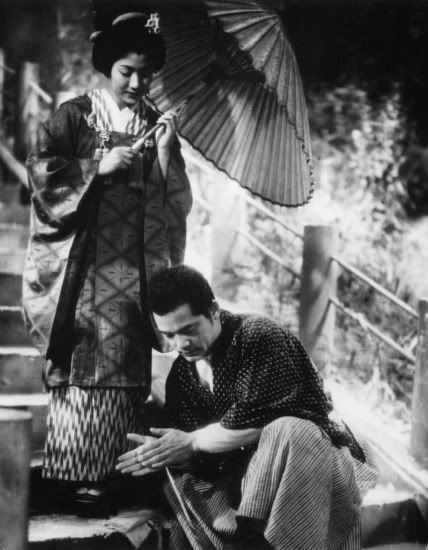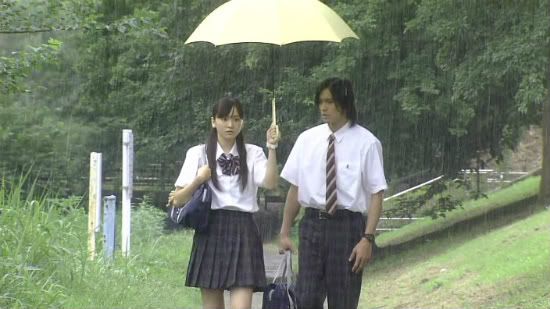It's true, a lot of Japanese don't like to say "I love you" or go on about stars in the eyes and unyielding, undying passion, and make out heavily in public. At least, back then. We didn't even have a word for love until fairly recently in our country's history. But this has been changing since after World War II, when we were encouraged to be more romantic, and America became popular, and romance and kissing scenes were inserted into films for a more international appeal (even though most of the cast was played by men). But it's not that we aren't romantic. Sure, kids today are fans of the cultures of America and Korea and wherever and are more than happy to hold hands in public and talk about love and romance. But from an outsider's view (or the view of today's youth who are seeking true love and have better things to do than read into obscure cultural facts like yours truly, Japan just doesn't seem to have all that lovey-dovey stuff that everybody wants now.
But stop a minute, and think about it. In Japanese dramas, a lot of the tense scenes are nearly silent, filled with looks and small gestures. How many Kurosawa and other WWII-era films feature a woman in the rain? Since Japan is comparatively conservative in public (albeit privately more liberated and mature sexually) men and women didn't like to meet and be seen like that, especially if they weren't sure if they wanted to be married yet. So girls would purposefully "forget" their umbrellas when it was supposed to rain or snow, and wander the streets hoping a handsome gentleman would arrive and offer to share his umbrella with her. Whether the meeting was predestined or coincidental, walking together under an umbrella became the symbol of love and romance, and girls would swoon over the idea, and guys would always carry an umbrella with them.

But you're a teenager and you want some melodrama. No problem. That motif is still used today and understood by modern-day Japanese as an understated and lasting symbol of the beginning of a relationship.

Think of Kon Satoshi's animated film Millennium Actress. A girl meets a boy, feels a connection, and the two barely share any words with one another. They do not talk of love, they talk about the future, and hope. And that brief moment was enough for her to spend the rest of her life striving to find him again. That is more significant than a teenaged date, I think, and many Japanese stories are littered with such quiet, simple allusions to something much bigger and more overpowering. Language is extremely important in Japan, and warrants its own entry, but I'll briefly explain: the more you say, the longer your words are, the more formal you are being. After you are in a close relationship with someone, you will leave out more and more specifics, until eventually you may only say a word, or nothing at all, and they'll be able to understand you. That's the Japanese ideal of love. At least, it was. Couples used to (and some still do) never tell one another "I love you". Because words are so important, and the word "love" is a well-known one, it is believed that, to say that, is an insult to your relationship. Because other people can use that word, and you're meant to feel that there is no word in any language that can express the true feeling of your relationship. People were meant to spend their entire lives, their sole purpose, to be able to communicate how they felt for one another, without the bonds of language confusing or labeling that feeling.
I'll talk more about the importance of words in Japan and how the idea is used in an upcoming entry, please look forward to it!
Movies and entertainment that romanticize emotions aside, do Japanese people who identify themselves with the modern westernized generation still have at least a bit of this notion of lack of vocal declaration in their everyday love life? Or is this only integrated into the culture of more traditional people (such as yourself) and in dramas?
ReplyDeleteIt's very common in general, the way the language itself is by degrees of politeness. Saying "I love you" is something very direct and personal, ie the opposite of how you're supposed to present yourself. For example, if you wanted to ask somebody if they wanted something, you'd phrase it like "You don't want to do this, right?", or you wouldn't use the word "hate" you'd say like+negative or good+negative instead of "bad", or instead of saying someone is attractive, you'd say they were "interesting", etc. This is how it is in modern colloquialism, so it only goes to follow that saying you love someone and you think about them and want to be with them are all the sorts of things you don't say directly, instead you'd say you liked or really liked them, or wanted to meet them. I actually haven't heard any of my friends directly say they loved someone, it's rare enough to hear them say they "really like" someone with the less intense and direct phrasing. And most of them aren't traditional like me!
ReplyDeleteI think you are interesting.
Deletehello, nice blog, trully
ReplyDelete